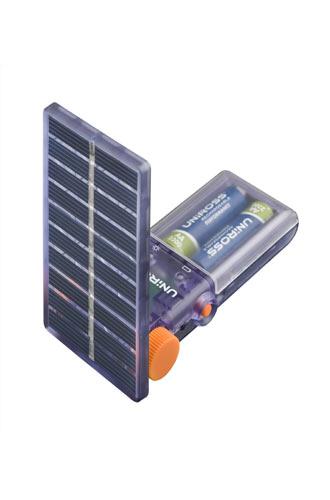
It get's to me that we are all quilty of poisoning the very earth that we hold so dear, every time we use our tv remote control!
Gadgets are everywhere and they all use batteries. Count how many batteries you have in your house right now - it adds up very quickly, once you give it a bit of thought.
Sure you can recycle batteries, but it ain't easy, basically you have to post them in bulk in special enevelopes and send them to one of the...
Battery Recycle centres around the UK
You see the problem is it isn't profitable because batteries are difficult to recycle. Instead we would rather throw them into land-fill and let them rot, seriously contaminating the soil for decades to come, whilst also polluting run-off water into the bargain, killing fish and plants alike.
So we have to find a way to reduce their use, these days there are several ways and they also save you lots of money!
We
just need to catch on to these clever innovations as soon as possible!
Rechargeable batteries have come of age
'The Gadget Show' reviewed AA rechargeables and voted the Uniross 2700 mAh battery the most effecient. Even the 'World Wildlife Fund' has promoted their use:

Why not recharge your battery using Solar power?
It is possible
but it appears the main question is actually the life of the rechargeable batteries themselves, especially if you only use them occasionally as they end up so flat you can't recharge them anyway.
also you need quite a lot of sun!
given that a charging current under full sunlight provides just 150mA
These are typical battery charging times from empty:
AAA batteries
800 mAh - 5 hours 30 minutes
1000 mAh - 8 hours
AA batteries
1600 mAh - 9 hours
2100 mAh - 20 hours
2300 mAh - 21 hours
2500 mAh - 24 hours
2700 mAh - 26 hours
Times above relate to the U0148917 Uniross Solar Charger (cost around £28-31 at 1st Jan '09) - see pic below

but you can also get another solar recharger called the Freeloader (cost around £24 at 1st Jan '09), which contains its own battery (which itself will run out after 2 years) so using the solar panel (not optional USB method), it will take over 14 hours for the included 1300mAh batteries to charge from empty, as it will charge it's own 1000mAh Li-ion battery first, so you can store energy, for up to 3 months, for that rainy day when there's no sun!
LINKS to buy your rechargeable batteries
http://www.uniross.com/consumer_html/
http://www.medusa-uk.com (was cheapest in Jan '09)
http://www.batterycompany.co.uk
http://www.twenga.co.uk (compares prices with amazon, ebay and others)
Summary
• Using rechargeable batteries is both environmentally and economically better, so doing it is a no-brainer
• Choose your battery power based on how long you are prepared to wait for a new set to charge and how many spares you need to store
• Solar powered chargers limited and are only of use in sunny places, when you have the time, ideal for some holidays. Expensive and slow, not a great way to minimise your carbon footprint
• The Freeloader's internal battery will power a mobile phone for up to 44 hours, an iPod for up to 18 hours, a PSP for up to 2.5 hours and a PDA for up to 22 hours, whilst you can also charge it via USB if you're near a computer. USB option also available for Uniross solar charger but it can only charge 3 types of batteries, although it is lighter and quicker
• My Tips: Label your batteries in two's or four's with a marker pen so you don't mix battery strength's in the same appliance. Mains powered chargers are super quick these days, so this saved time is more efficient, some also double as a battery strength indicator to.
My advice
Phase out your disposable batteries, buy a regular charger with some good Uniross batteries (bundled together they are even cheaper). Use mdsbattery link above to buy batteries seperately. Save dead batteries and post them off for recycling properly.